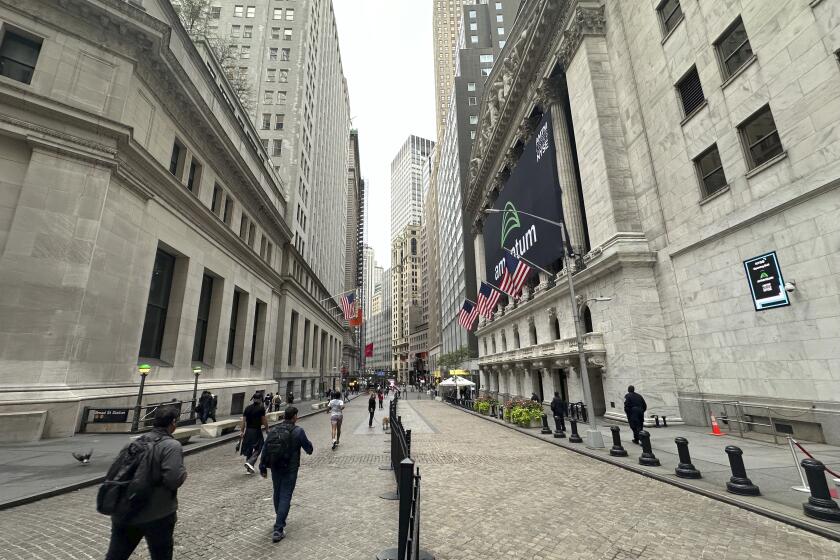Consumer Confidence Slips Again in October
Consumer confidence fell in October for the fourth straight month, a sign that the so-called wealth effect might be true in reverse.
That would mean if Americans spend more when the stock market is booming, they also spend significantly less when the market goes down.
Economists say the upcoming holiday season will be the key--and it may be looming at an inopportune time.
“We’re off the expansion highs,” said Brian Jones, an economist at Salomon Smith Barney/Citibank. “We won’t have a good handle on it until we know what fourth-quarter [consumer] spending is going to be.”
Jones added that the consumer confidence index typically sags in October, only to rebound in November with the launch of the holiday shopping season.
The index, compiled by the Conference Board, a private business research group in New York, does not measure spending at all. Rather, it attempts to capture the mood of the all-important American consumer by asking a sample of 5,000 households how they perceive current economic conditions, and how they expect economic conditions to be in six months.
The resulting index fell to 130 in October, from 134 in September and 139 in June.
But the June figure was its highest in more than 30 years, and it remains well ahead of the 119 registered a year ago. Lynn Franco, an economist for the Conference Board, said that during recessions, the index typically dips well down into the 80s. The index is calibrated on a scale in which the average for 1985 was 100.
“Even though we’ve had a decline, we’re still at levels that indicate there’s plenty of steam left in the economy,” Franco said. “We’re still predicting strong consumer spending. It just means we’re not overheating, which is good.”
Although there is no direct connection between the consumer confidence index and actual spending, understanding the mood of the American consumer is key to understanding the U.S. economy, since consumption is the economy’s driving force. Personal consumption accounts for more than two-thirds of U.S. gross domestic product.
Analysts cited concern over the holiday shopping outlook in explaining a broad falloff in retail stocks on Wall Street on Wednesday.
“The drop we’ve seen in consumer confidence since its peak in June isn’t a huge change, but it’s large enough to be worth thinking about what’s causing it,” said Peter Kretzmer, senior economist with Bank of America Corp. He said he thought the lower figure reflected recent turbulence in the stock markets, as well as higher interest rates.
“And higher oil prices,” he added. “It’s eroding people’s confidence, going to the gas pumps all the time and seeing significant price increases.”
Kretzmer said it is too soon to say whether the American consumer’s apparent, relatively mild case of the doldrums might signal a decline in consumer spending right at the crucial holiday season. Historically, he said, dramatic declines in personal consumption have followed sudden, double-digit declines in the confidence index, not gentle slippage like the current one.
“The best predictor of the level of consumer confidence isn’t the stock market, but how long the expansion’s been in place,” he said. “It’s going to take some bad news to make people stop feeling happy, because they’ve had a long period of nothing but good news.”
Still, Kretzmer said, increased involvement in the stock markets by the American middle class may now be changing consumer behavior.
In the past, the stock market could bounce around erratically and consumers didn’t take much notice. Stock trading was largely a concern of the wealthy.
Now, however, more middle-class Americans own stocks than in the past, and they presumably follow the markets’ ups and downs more closely. If they change their spending habits on the basis of Wall Street’s fortunes, then a sustained bear market could have a much more powerful negative effect on the U.S. economy than it would have before.
(BEGIN TEXT OF INFOBOX / INFOGRAPHIC)
Not So Bullish
The consumer confidence index has fallen for four straight months amid higher interest rates and eroding stock prices.October:
130.1Month ago: 134.2
Year ago: 119.3Source: Conference BoardFrom a monthly survey of 5,000 U.S. households.
Index: 1985=100.
More to Read
Inside the business of entertainment
The Wide Shot brings you news, analysis and insights on everything from streaming wars to production — and what it all means for the future.
You may occasionally receive promotional content from the Los Angeles Times.










